Ditapis dengan
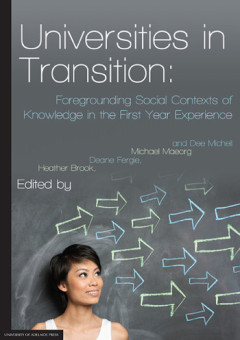
Universities in transition :foregrounding social contexts of knowledge in the…
Universities are social universes in their own right. They are the site of multiple, complex and diverse social relations, identities, communities, knowledges and practices. At the heart of this book are people enrolling at university for the first time and entering into the broad variety of social relations and contexts entailed in their ‘coming to know’ at, of and through university. By r…
- Edisi
- -
- ISBN/ISSN
- 9781922064837
- Deskripsi Fisik
- xi, 244p. : ill.
- Judul Seri
- -
- No. Panggil
- 378.1980994 UNI u

The social dynamics of open data
The Social Dynamics of Open Data is a collection of peer reviewed papers presented at the 2nd Open Data Research Symposium (ODRS) held in Madrid, Spain, on 5 October 2016. Research is critical to developing a more rigorous and fine-combed analysis not only of why open data is valuable, but how it is valuable and under what specific conditions. The objective of the Open Data Research Symposium a…
- Edisi
- -
- ISBN/ISSN
- 9781928331568
- Deskripsi Fisik
- viii, 200p. : ill.
- Judul Seri
- -
- No. Panggil
- 352.88 SOC s

Sharing knowledge, transforming societies :the Norhed Programme 2013-2020
"In June 2016, the Norwegian Programme for Capacity Development in Higher Education and Research for Development (Norhed) hosted a conference on the theme of ‘knowledge for development’ in an attempt to shift the focus of the programme towards its academic content. This book follows up on that event. The conference highlighted the usefulness of presenting the value of Norhed’s different p…
- Edisi
- -
- ISBN/ISSN
- 9781928502005
- Deskripsi Fisik
- xxxix, 570p. : ill.
- Judul Seri
- -
- No. Panggil
- 378.6 SHA s
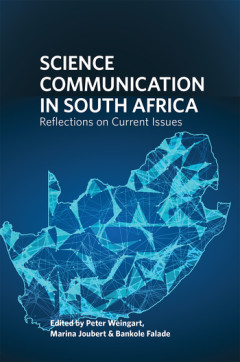
Science communication in South Africa :reflections on current issues
"Why do we need to communicate science? Is science, with its highly specialised language and its arcane methods, too distant to be understood by the public? Is it really possible for citizens to participate meaningfully in scientific research projects and debate? Should scientists be mandated to engage with the public to facilitate better understanding of science? How can they best communicate …
- Edisi
- -
- ISBN/ISSN
- 9781928502050
- Deskripsi Fisik
- iv, 231p. : ill.
- Judul Seri
- -
- No. Panggil
- 001.4028558 SCI s
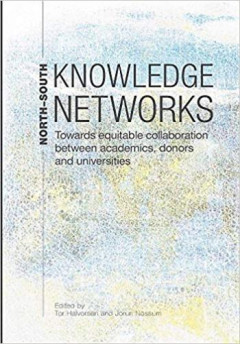
North-South knowledge networks :towards equitable collaboration between acade…
Since the 1990s, internationalisation has become key for institutions wishing to secure funding for higher education and research. For the academic community, this strategic shift has had many consequences. Priorities have changed and been influenced by new ways of thinking about universities, and of measuring their impact in relation to each other and to their social goals. Debates are ongoing…
- Edisi
- -
- ISBN/ISSN
- 9781928331308
- Deskripsi Fisik
- xv, 310p. : ill.
- Judul Seri
- -
- No. Panggil
- 378 NOR n

Open data in developing economies :toward building an evidence base on what w…
Recent years have witnessed considerable speculation about the potential of open data to bring about wide-scale transformation. The bulk of existing evidence about the impact of open data, however, focuses on high-income countries. Much less is known about open data’s role and value in low- and middle-income countries, and more generally about its possible contributions to economic and social…
- Edisi
- -
- ISBN/ISSN
- 9781928331599
- Deskripsi Fisik
- v, 275p. : ill.
- Judul Seri
- -
- No. Panggil
- 352.38091724 VER o

Knowledge for a sustainable world :a Southern African-Nordic contribution
The search for answers to the issue of global sustainability has become increasingly urgent. In the context of higher education, many universities and academics are seeking new insights that can shift our dependence on ways of living that rely on the exploitation of so many and the degradation of so much of our planet. This is the vision that drives SANORD and many of the researchers and instit…
- Edisi
- -
- ISBN/ISSN
- 9781928331049
- Deskripsi Fisik
- xi, 244p. : ill.
- Judul Seri
- -
- No. Panggil
- 338.96807 KNO k
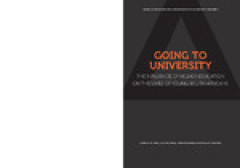
Going to university :the influence of higher education on the lives of young …
Around the world, more young people than ever before are attending university. Student numbers in South Africa have doubled since democracy and for many families, higher education is a route to a better future for their children. But alongside the overwhelming demand for higher education, questions about its purposes have intensified. Deliberations about the curriculum, culture and costing of p…
- Edisi
- -
- ISBN/ISSN
- 9781928331698
- Deskripsi Fisik
- ix, 164p. : ill.
- Judul Seri
- -
- No. Panggil
- 378.68 GOI g
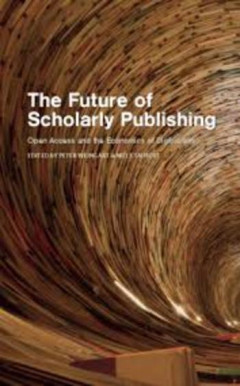
The future of scholarly publishing :open access and the economics of digitisa…
The formal scientific communication system is currently undergoing significant change. This is due to four developments: the digitisation of formal science communication; the economisation of academic publishing as profit drives many academic publishers and other providers of information; an increase in the self-observation of science by means of publication, citation and utility-based indicato…
- Edisi
- -
- ISBN/ISSN
- 9781928331537
- Deskripsi Fisik
- ix, 277p. : ill.
- Judul Seri
- -
- No. Panggil
- 070.57973 FUT f

The Politics of language contact in the Himalaya
- Edisi
- -
- ISBN/ISSN
- 9781783747078
- Deskripsi Fisik
- 200 p.; 23 cm.
- Judul Seri
- -
- No. Panggil
- 306.44 POL p
- Edisi
- -
- ISBN/ISSN
- 9781783747078
- Deskripsi Fisik
- 200 p.; 23 cm.
- Judul Seri
- -
- No. Panggil
- 306.44 POL p
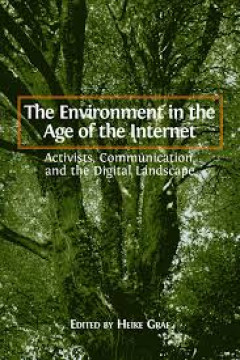
The Environment in the age of the internet
- Edisi
- -
- ISBN/ISSN
- 9781783742462
- Deskripsi Fisik
- 192 p.; 23 cm.
- Judul Seri
- -
- No. Panggil
- -
- Edisi
- -
- ISBN/ISSN
- 9781783742462
- Deskripsi Fisik
- 192 p.; 23 cm.
- Judul Seri
- -
- No. Panggil
- -

Culinary linguistics :the chef's special
Language and food are universal to humankind. Language accomplishes more than a pure exchange of information, and food caters for more than mere subsistence. Both represent crucial sites for socialization, identity construction, and the everyday fabrication and perception of the world as a meaningful, orderly place. This volume contains an introduction to the study of food and an extensive over…
- Edisi
- -
- ISBN/ISSN
- 9789027202932
- Deskripsi Fisik
- xvi, 347p. : ill.
- Judul Seri
- -
- No. Panggil
- 420.147 CUL c

Connecting grammaticalisation
This monograph presents a view on grammaticalisation radically different from standard views centering around the cline of grammaticality. Grammar is seen as a complex sign system, and, as a consequence, grammatical change always comprises semantic change. What unites morphology, word order, constructional syntax and other grammatical subsystems is their paradigmatic organisation. The tradition…
- Edisi
- -
- ISBN/ISSN
- 9789027284136
- Deskripsi Fisik
- xiii, 347p. : ill.
- Judul Seri
- -
- No. Panggil
- 415 NOR c
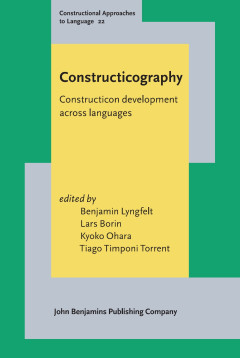
Constructicography :constructicon development across languages
In constructionist theory, a constructicon is an inventory of constructions making up the full set of linguistic units in a language. In applied practice, it is a set of construction descriptions – a “dictionary of constructions”. The development of constructicons in the latter sense typically means combining principles of both construction grammar and lexicography, and is probably best c…
- Edisi
- -
- ISBN/ISSN
- 9789027263865
- Deskripsi Fisik
- viii, 313p. : ill.
- Judul Seri
- -
- No. Panggil
- 415.01836 CON c
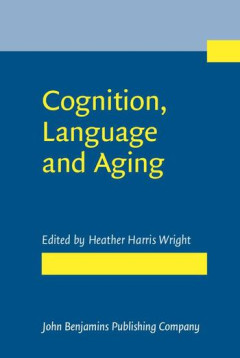
Cognition, language and aging
Age-related changes in cognitive and language functions have been extensively researched over the past half-century. The older adult represents a unique population for studying cognition and language because of the many challenges that are presented with investigating this population, including individual differences in education, life experiences, health issues, social identity, as well as gen…
- Edisi
- -
- ISBN/ISSN
- 9789027267313
- Deskripsi Fisik
- viii, 248p. : ill.
- Judul Seri
- -
- No. Panggil
- 408.46 COG c
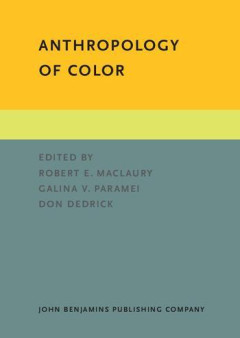
Anthropology of color :interdisciplinary multilevel modeling
The field of color categorization has always been intrinsically multi- and inter-disciplinary, since its beginnings in the nineteenth century. The main contribution of this book is to foster a new level of integration among different approaches to the anthropological study of color. The editors have put great effort into bringing together research from anthropology, linguistics, psychology, sem…
- Edisi
- -
- ISBN/ISSN
- 9789027291707
- Deskripsi Fisik
- xx, 485p. : ill.
- Judul Seri
- -
- No. Panggil
- 306.44 ANT a
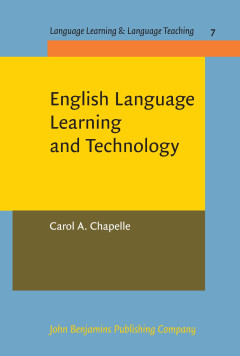
English language learning and technology :lectures on applied linguistics in …
This book explores implications for applied linguistics of recent developments in technologies used in second language teaching and assessment, language analysis, and language use. Focusing primarily on English language learning, the book identifies significant areas of interplay between technology and applied linguistics, and it explores current perspectives on perennial questions such as how …
- Edisi
- -
- ISBN/ISSN
- 9789027217042
- Deskripsi Fisik
- xvi, 213p. : ill.
- Judul Seri
- -
- No. Panggil
- 428.0071 CHA e
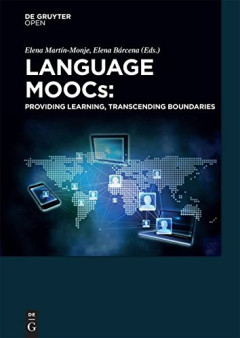
Language MOOCs :providing learning, transcending boundaries
Language MOOCs (or LMOOCs) are dedicated Web-based online courses for second languages with unrestricted access and potentially unlimited participation. They are generating interest and expectation in the contexts of university education, lifelong learning and online training in general. This pioneering book presents an initial analysis of the theoretical and methodological issues underlying LM…
- Edisi
- -
- ISBN/ISSN
- 9783110422504
- Deskripsi Fisik
- x, 175p. : ill.
- Judul Seri
- -
- No. Panggil
- 371.3344678 LAN l

Education, economy and identity :ten years of educational reform in Thailand
Modern education in Thailand started at the end of the nineteenth century under the impulse of King Chulalongkorn. Many scholars tracing back the evolution from traditional education to a modern education system emphasized the feeling of necessity that motivated this transformation. Wyatt (1969), Mead (2004) and Watson (1982) underlined the need for a modern administration, to handle the Siames…
- Edisi
- -
- ISBN/ISSN
- 9786169028208
- Deskripsi Fisik
- 114p. : ill.
- Judul Seri
- -
- No. Panggil
- 379.593 EDU e
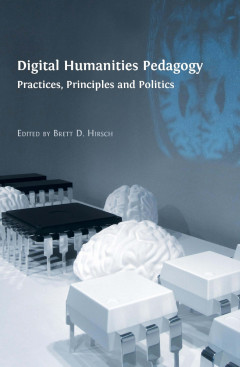
Digital humanities pedagogy :practices, principles and politics
Academic institutions are starting to recognize the growing public interest in digital humanities research, and there is an increasing demand from students for formal training in its methods. Despite the pressure on practitioners to develop innovative courses, scholarship in this area has tended to focus on research methods, theories and results rather than critical pedagogy and the actual prac…
- Edisi
- -
- ISBN/ISSN
- 9782821854031
- Deskripsi Fisik
- xix, 426p. : ill.
- Judul Seri
- -
- No. Panggil
- 001.30711 DIG d
 Karya Umum
Karya Umum  Filsafat
Filsafat  Agama
Agama  Ilmu-ilmu Sosial
Ilmu-ilmu Sosial  Bahasa
Bahasa  Ilmu-ilmu Murni
Ilmu-ilmu Murni  Ilmu-ilmu Terapan
Ilmu-ilmu Terapan  Kesenian, Hiburan, dan Olahraga
Kesenian, Hiburan, dan Olahraga  Kesusastraan
Kesusastraan  Geografi dan Sejarah
Geografi dan Sejarah